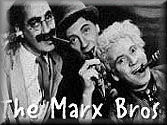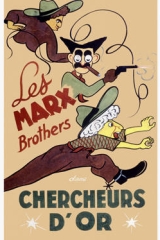A NIGHT IN CASABLANCA
(1946)With Groucho Marx, Harpo Marx, Chico Marx, Sig Ruman, Lisette Verea, Fredrick Guitman
Directed by Archie Mayo
Black and White
Reviewed by JL and JB
 After their five-year premature retirement, the Marx Brothers returned
to the screen in A NIGHT IN CASABLANCA, mainly because (all together
now) Chico needed the money. It was their best film since AT
THE
CIRCUS, which isn't saying much, but it was probably as good
as could
be hoped for under the circumstances. An independent
production
released by United Artists, the film was noticeably lacking in the
production values of their Paramount or, especially, MGM
films.
Long gone also were the days of Kaufmans and Ryskinds and Kalmars and
Rubys (although an uncredited Frank Tashlin did contribute a few
memorable sight gags to the picture). There was also the
matter
of director Archie Mayo, who was known as a nice guy during his
studio-contract days at Warners and Fox, but who had become a notorious
on-set tyrant once he started freelancing in the '40s. He and
the
brothers locked horns almost daily, with Groucho referring to him as
the "fat slob" who was "ruining the picture." Despite such
encumbrances, A NIGHT IN CASABLANCA is worthwhile for a handful of
memorable scenes, a couple of handfuls of quotable one-liners, and
Harpo's most unrestrained performance since the Paramount
days.
All the brothers, in fact, proved they still had it in them.
By
the time of their final film (LOVE HAPPY) three years later,
it seemed
as if they'd aged 20 years.
After their five-year premature retirement, the Marx Brothers returned
to the screen in A NIGHT IN CASABLANCA, mainly because (all together
now) Chico needed the money. It was their best film since AT
THE
CIRCUS, which isn't saying much, but it was probably as good
as could
be hoped for under the circumstances. An independent
production
released by United Artists, the film was noticeably lacking in the
production values of their Paramount or, especially, MGM
films.
Long gone also were the days of Kaufmans and Ryskinds and Kalmars and
Rubys (although an uncredited Frank Tashlin did contribute a few
memorable sight gags to the picture). There was also the
matter
of director Archie Mayo, who was known as a nice guy during his
studio-contract days at Warners and Fox, but who had become a notorious
on-set tyrant once he started freelancing in the '40s. He and
the
brothers locked horns almost daily, with Groucho referring to him as
the "fat slob" who was "ruining the picture." Despite such
encumbrances, A NIGHT IN CASABLANCA is worthwhile for a handful of
memorable scenes, a couple of handfuls of quotable one-liners, and
Harpo's most unrestrained performance since the Paramount
days.
All the brothers, in fact, proved they still had it in them.
By
the time of their final film (LOVE HAPPY) three years later,
it seemed
as if they'd aged 20 years.  - JL
- JL
 As mentioned above, one of the
things that
killed the Marx Brothers was their inability to hire top writers like
George Kaufman, Bert Kalmar and Harry Ruby or S. J. Perelman for their
post-A DAY AT
THE RACES films. Without the kind of clever,
thoughtful and satirical jokes found in ANIMAL CRACKERS, DUCK SOUP
or A
NIGHT AT THE OPERA,
the Marx Brothers were simply another comedy team,
just slightly above the Three Stooges or the Ritz Brothers.
However, with the Brothers themselves investing in A NIGHT IN
CASABLANCA, they approach their average material with an energy not
seen since A DAY AT THE RACES, making everything seem funnier than it
really is. The Brothers still firmly believed in Irving Thalberg's A
NIGHT AT THE OPERA rules, despite its track record of failure, but in A
NIGHT IN CASABLANCA the young lovers are so inconsequential you hardly
even notice they are there, and aside from Harpo and Chico's mandatory
musical specialties, there is only song - the 1923 Ted Snyder, Bert
Kalmar and Harry Ruby ditty "Who's Sorry Now?", which had the
built-in benefit of having already been a hit in the past.
Sig
Ruman and Lisette
Verea play their parts of Nazi villains with just the right sense of
fun, helping lift the film above such previous disappointments as THE BIG
STORE and GO
WEST. A NIGHT IN CASABLANCA may not be one of
the
Brothers' great films, but it is good fun, and by 1946, good fun was
the best you could hope for in a Marx Brothers movie.
As mentioned above, one of the
things that
killed the Marx Brothers was their inability to hire top writers like
George Kaufman, Bert Kalmar and Harry Ruby or S. J. Perelman for their
post-A DAY AT
THE RACES films. Without the kind of clever,
thoughtful and satirical jokes found in ANIMAL CRACKERS, DUCK SOUP
or A
NIGHT AT THE OPERA,
the Marx Brothers were simply another comedy team,
just slightly above the Three Stooges or the Ritz Brothers.
However, with the Brothers themselves investing in A NIGHT IN
CASABLANCA, they approach their average material with an energy not
seen since A DAY AT THE RACES, making everything seem funnier than it
really is. The Brothers still firmly believed in Irving Thalberg's A
NIGHT AT THE OPERA rules, despite its track record of failure, but in A
NIGHT IN CASABLANCA the young lovers are so inconsequential you hardly
even notice they are there, and aside from Harpo and Chico's mandatory
musical specialties, there is only song - the 1923 Ted Snyder, Bert
Kalmar and Harry Ruby ditty "Who's Sorry Now?", which had the
built-in benefit of having already been a hit in the past.
Sig
Ruman and Lisette
Verea play their parts of Nazi villains with just the right sense of
fun, helping lift the film above such previous disappointments as THE BIG
STORE and GO
WEST. A NIGHT IN CASABLANCA may not be one of
the
Brothers' great films, but it is good fun, and by 1946, good fun was
the best you could hope for in a Marx Brothers movie.
Over the years, I have noticed a great growing fondness amongst my fellow Marx Brothers
fans for A NIGHT IN CASABLANCA, a fondness I also share. While Joe Adamson
basically dismisses the film in GROUCHO, HARPO, CHICO AND SOMETIMES
ZEPPO, as do Paul D. Zimmerman and Burt Goldblatt in THE MARX RBOTHERS
AT THE MOVIES, A NIGHT IN CASABLANCA still feels to me like the first real
Marx Brothers movie since A NIGHT AT THE OPERA. It has something of a
Paramount feel to it, with a bit of MGM plot-weaving, and an
especially welcome Victor Heermanesque attitude that what's important
in a Marx Brothers movie is The Marx Brothers, not the plot scenes or
the songs productions.  - JB
- JB
The Marx Brothers The Age of Comedy
ADD ANOTHER QUOTE AND MAKE IT A GALLON
"I see. You want a manager that doesn't steal money... Good day, gentlemen!"
Notes by John V. "Jay" Brennan
A BOW FOR HARPO
AND CHICO
Harpo's Solo: "Hungarian Rhapsody #2" (Franz Liszt). The most famous of 19 Hungarian Rhapsodies Liszt composed.
Chico's Solos: "Beer Barrel Polka" and "Moonlight Cocktail". A
rare instance of Chico getting to play to complete piano solos in a
row (not counting MONKEY BUSINESS, which was a continuous medley, or
HORSE FEATHERS, which was a song and a solo). See the AT THE
CIRCUS review for notes on "Beer Barrel
Polka". "Moonlight Cocktail" was written by Kim Gannon
(words) and Lucky Roberts (music), and was a 1942 hit for
The Glenn Miller Orchestra.
Chico opens his version of "Beer Barrel Polka" with the opening
piano chords of Liszt's "Hungarian Rhapsody #2", which is what Harpo plays on the harp in this film.
BEHIND THE SCREEN
"I was terribly depressed at the preview. We had worked so
long
and hard on this, and thought we had it so solid and tight, and then to
see reams of it emasculated by that fat idiot (Mayo), well, it was
heart rending... I'm sure it will be better than THE BIG STORE, but it
will never be another NIGHT AT THE OPERA."
---- Groucho, in a letter to his daughter Miriam, circa
January,
1946 (Love, Groucho by
Miriam
Marx Allen; Faber and Faber, 1992)


